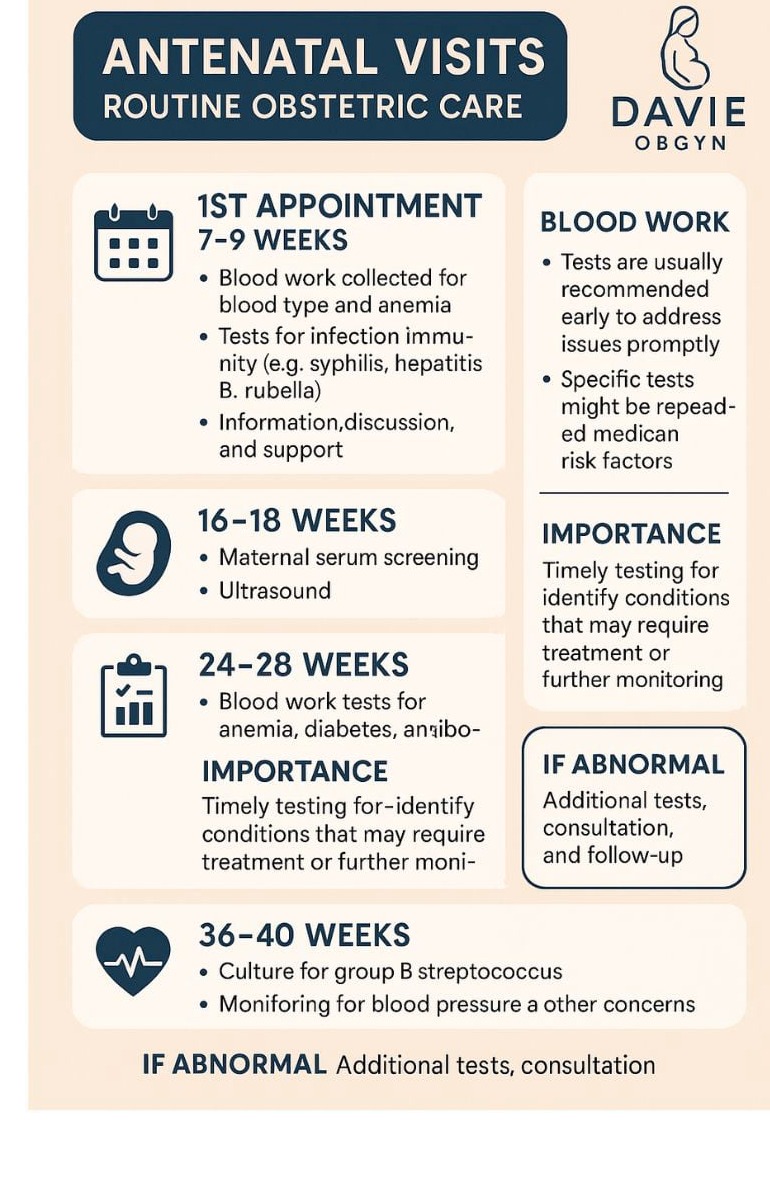What to expect during your routine Ob visits?
These are some of the tests that you can expect as part of your pregnancy Journey.
Routine Antenatal Visits: What to Expect
1. First Prenatal Visit (7–9 weeks)
Goals:
- Confirm intrauterine pregnancy and viability.
- Detailed health history and risk assessment.
- Counseling on lifestyle, prenatal vitamins, genetic screening options.
Blood Work: (Usually drawn around 11 weeks to minimize redundant blood draws)
- CBC (anemia, platelets)
- Blood type and Rh factor
- Antibody screen
- Rubella, Hepatitis B, HIV, Syphilis, Varicella immunity
- Urinalysis and urine culture
- Gonorrhea/Chlamydia swab
- Pap smear if overdue.
Optional: Early glucose screening (if risk factors)
Why it matters:
Early detection of anemia, infections, or blood group incompatibilities allows for prompt intervention.
If abnormal:
- Anemia: nutritional counseling, iron supplementation
- Rh-negative: plan for Rhogam at 28 weeks and postpartum if needed
- Positive STI: treatment and partner testing
2. 12–13 Weeks
Goals:
- Nuchal translucency ultrasound (if doing first trimester combined screening)
- Discuss noninvasive prenatal testing (NIPT), if not already done
- Blood Work:
- NIPT if opted
If abnormal:
- High-risk results prompt genetic counseling and possible diagnostic testing (CVS or amniocentesis)
3. 16–18 Weeks
Goals:
- Review maternal serum screening (quad screen if done)
- Assess fetal heart tones
- Address any symptoms or concerns
Blood Work:
- Quad screen (AFP, hCG, Estriol, Inhibin A)
- If abnormal:
- Elevated AFP may indicate open neural tube defects — refer for targeted ultrasound.
Abnormal aneuploidy markers — offer genetic counseling and further testing.
4. 18–20 Weeks
Goals:
- Anatomy ultrasound to assess fetal development, placenta, amniotic fluid
- No blood work unless other concerns arise.
5. 24–28 Weeks
Goals:
- Monitor growth, fetal movement
- Begin preterm labor education
Blood Work:
- 1-hour glucose tolerance test (GTT)
- CBC (repeat anemia screen)
- Antibody screen (if Rh-negative)
If abnormal:
- GTT abnormal → 3-hour test or direct diagnosis of gestational diabetes → nutrition referral, monitoring
- Low hemoglobin → iron supplementation
- Positive antibody screen → further typing and monitoring for alloimmunization
6. 28 Weeks
Interventions:
- Rhogam administered if Rh-negative and antibody screen is negative
- Begin fetal kick count education
7. 32–34 Weeks
Goals:
- Discuss birth plan, signs of labor, hospital procedures
- Assess fetal position and well-being
- Address anxiety or support needs
- No routine blood work unless indicated (e.g., preeclampsia concerns)
8. 36 Weeks
Goals:
- Group B Strep vaginal/rectal culture
- Cervical check if symptoms suggest labor
If GBS positive:
- Plan for intrapartum IV antibiotics during labor
9. 37–40 Weeks
Goals:
- Weekly visits to assess for labor signs, BP, fetal well-being
- Cervical exams as needed
- Fetal positioning, delivery timing discussions
- If concerns (e.g., high BP, growth issues):
- May order NST, BPP, or additional labs (LFTs, urine protein)
Key Takeaways for Patients
Timely testing = better outcomes. Early intervention reduces risk to both mother and baby.
Most abnormal results are manageable with early detection and appropriate treatment.
Communication is key — we’ll always discuss results, next steps, and answer questions along the way.

